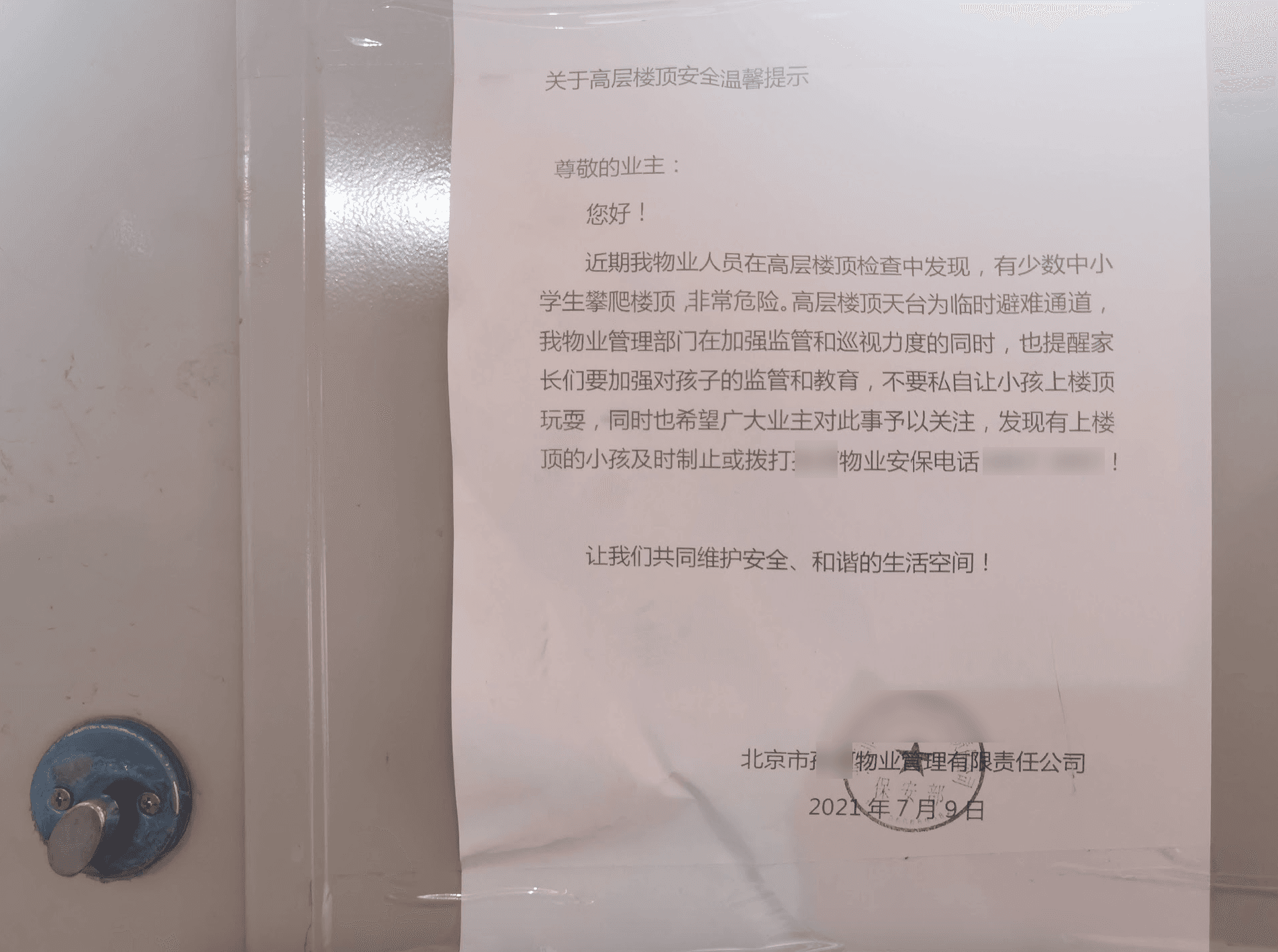
My residential area has not enforced mandatory nucleic acid testing for three consecutive days, entering a state of regular nucleic acid testing. We are not allowed to go out unless necessary - if you do not have a negative nucleic acid test result within 48 hours, you can only walk on the street.
As a lazy person, I don't go downstairs unless necessary, so I haven't done a nucleic acid test during these days. Therefore, I can't go anywhere and don't want to go anywhere - but I still want to go to the rooftop to enjoy the breeze.
The rooftop is a corridor on the top floor that leads to the neighboring building and is also the highest point of the residential area, offering a panoramic view of the surroundings. I used to go to the rooftop often to enjoy the view, especially during the quarantine period when the rooftop was the only place where I could "get some fresh air."
When I went there today, I found that the door to the rooftop was locked. There was a property notice posted on the door, which was from last year. The content of the notice is as follows:

The notice conveyed several pieces of information:
- A hidden danger: Property personnel found that some primary and secondary school students were climbing to the rooftop, which may be the reason for locking the door.
- A function: The rooftop serves as a temporary refuge. If a fire occurs in one unit, residents can escape to the neighboring unit through the rooftop.
- A measure: The property management department will strengthen supervision and inspection (to reduce the risk of students falling from the building).
- A suggestion: Parents should strengthen supervision and education of their children.
The notice is well-written, explaining the reasons, stating the measures, and being clear and concise. But why lock the door?
I speculate that there are several reasons:
- Better safe than sorry: If someone accidentally falls from the rooftop, who will be held responsible? It's not clear. And the property management is also afraid of public criticism.
- Limited manpower: During the pandemic, there is a shortage of personnel. Strengthening supervision and inspection, as mentioned in the notice, probably lacks the necessary manpower.
- Preventing other risks, such as suicide: The rooftop is not a private place. If such an incident occurs, the blame will directly fall on the property management. However, if a homeowner jumps from their own window to commit suicide, the property management can at least distance themselves from the incident. There have been multiple cases of suicide during the pandemic across the country, so precautions must be taken.
Therefore, after weighing the pros and cons, the simplest and most direct way is to lock the door and eliminate all possibilities. The need for residents to enjoy the breeze? It's not important compared to the needs of the minority. A temporary refuge? It's a low-probability event and not worth worrying about.
Have you noticed that this operation is familiar? It's the same with the banning of users on online platforms, as well as the one-size-fits-all policies implemented in various places.
Generally, at this point, people would complain about lazy governance! In my opinion, lazy governance is just a broad and superficial description. The more important question is why they are lazy in governance.
I believe there are two main reasons, one being the vague legal system. Our country has never been a society that strictly adheres to the law. Ignoring the law when doing things is deeply rooted in Chinese culture. In ancient feudal times, although there were laws, the emperor's words could overturn them. Looking at the present, under the long-standing cultural inertia, from officials to ordinary people, there is still a serious disregard for the law. Just look at how labor laws are treated.
Although there has been a constant emphasis on building a legal society in recent years, the results have been minimal. The vagueness of the legal system leads to unclear responsibilities. The standards for evaluation are not clear, so decision-makers, in order to protect their own interests, choose the simplest and most crude way to lower the standards or implement one-size-fits-all policies.
The other reason is the bottom-up responsibility system. Lower-level officials focus on achieving the goals set by their superiors because their performance is evaluated by their superiors and their career paths are determined by their superiors. Sometimes, in order to avoid making mistakes, they would rather go to extremes as long as it makes their performance look "impressive." I have discussed similar examples in a previous article. (Revisiting "Currying Favor with Double Ships")
Do they care about the well-being of the ordinary people? Of course, they do, but it is not their priority because it does not determine their career paths. So, as long as the situation remains below a certain threshold, they don't have to worry too much. For example, locking the door is something that affects the needs of some residents to enjoy the breeze and the low probability of a fire incident preventing the use of the temporary refuge. These things are probably below the threshold.